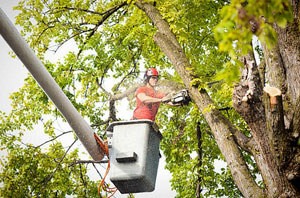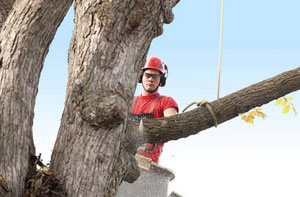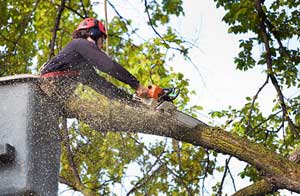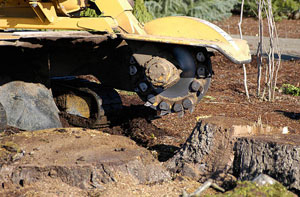Plymouth Tree Surgeons (PL1) Devon: Adding structure, substance and style to what can quite often be a two dimensional landscape, trees are a vital feature of gardens and properties in Plymouth. This is fine and dandy, however when trees are poorly maintained, diseased, or affected by extreme weather conditions such as flooding or high winds, issues may arise which will need to be addressed. Seeking the expert advice of a certified tree surgeon in Plymouth, is the safest option when work needs to be done on your trees.
Folks in Plymouth who attempt to do tree work themselves, or by using non-qualified personnel may cause a risk of damage to the trees, to property and to life. However, tree work isn't even safe for experienced tree surgeons, who are aware of all the risks involved. Tree surgery is definitely not a task for amateurs, and on average there are 140 serious injuries and three deaths a year within the industry, making it one of the most hazardous jobs in Britain.

There's also a danger to life from damaged or neglected trees in Plymouth, as around five people per year are fatally wounded in Britain by falling branches and trees. If an injury occurs, or property is damaged due to you bringing in someone to do tree work, you might be liable for any compensation to any third-party. This is why using the services of an experienced Plymouth tree surgeon to work on your trees is very important. (Figures sourced from HSE).
There are two major industry bodies, at least one of which a certified Plymouth tree surgeon should be a signed up member of. Both the Arboricultural Association (AA) and the International Society of Arboriculture (ISA) offers a website where you can check up on the membership and professional standing of any tree surgeon. To discover whether any specific local tree surgeon has recognised Approved ARB Contractor status and has membership of either of these two organisations, you can check on this website.
For mediation assistance and for help and guidance at any point during or after the work has been carried out, you can make contact with either of these industry bodies.

You should not be afraid to respectfully decline the offer of a quotation from someone who you're unable to find on this directory list, since after all, it's a fully qualified and approved contractor who you are looking for. It's a good idea to get at least 3 different estimates from various companies in the Plymouth area, when you've diligently checked their accreditations and professional associations. You should ask the below questions whilst getting the quotations, expressing that you need to know the answers due to the risks involved in tree surgery work:
- Do you supply quotations in writing? You should NEVER accept a verbal quote only. Only ever accept a quote in writing.
- Exactly what is your level of insurance cover? Do not even consider a tree surgeon in Plymouth with less than £5 Million public liability insurance as recommended by the AA and ISA.
- Have you got documents to indicate that you have the correct qualifications, membership of the ISA or AA, and also a certificate for chainsaw use and maintenance from the NPTC/LANTRA? It is required by law that any tree surgeon/worker using a chainsaw must hold a NPTC/LANTRA certificate. Qualifications can include City and Guilds Certificates and National Diplomas in Arboriculture.
- Is It Possible To contact a recent person who you have worked for so I can assess the standard of your workmanship? Doing an independent examination of any recent work is always advisable.
Clear and concise specifics of all the tree work that is being undertaken should be included on the written quotation. It should mention who is responsible for the removal of tree branches, stumps and debris, and should also include details of any trees which could be protected, and the steps necessary to get permission to carry out work on them. Double check that VAT has also been included on the quote. It is very important that only skilled people are employed to work on your property and trees, and this is wholly your responsibility.
PRIOR TO WORK - Making enquiries into the possibility of any of your trees being protected, your chosen Plymouth tree surgeon should ensure that any tree work can get the go-ahead from the appropriate local authority department. To ensure public safety, even protected trees require maintenance in order to cut back dead or damaged wood, so discovering that a tree is protected doesn't mean that you're unable to carry out necessary work.
If your property in Plymouth is situated in a conservation area, the Local Planning Authority will require no less than six weeks written notice of any tree work you're planning to do. However, tree stems of less than 75 millimetres in diameter when measured at 1.5m above ground level are free from this requirement. Also, if a protected tree's branches need to be pruned or thinned to sustain and promote growth, written notice will not be necessary.

After carrying out a complete assessment of your trees health, your chosen Plymouth tree surgeon will decide on the remedial treatment required and how the required outcome can be achieved with safety in mind. Where there's any chance of falling debris, a risk assessment will have to be carried out on your property, public spaces, and parts of a neighbour's property that could be impacted. At this point, the level of protection needed and the number of operatives required will also be ascertained. This is both personal protective equipment (PPE) together with other safety precautions to keep property and the general public safe from harm or damage.
ON THE DAY OF WORK - Before any climbing, tree felling or cutting of branches is started, safety measures and barriers will be put in place to keep unauthorised persons away from the area of work. If there is a threat of falling debris into a public road, passing traffic might need to be stopped temporarily.
The tree surgeon will need different levels of protection based on the type of work being completed. At the very least when doing work with a chainsaw they will be wearing special protective clothing to prevent serious cutting injuries to the legs, torso and hands. Hi-vis clothing, and eye and head protection, must be worn by all workers involved in the operation.
Ladders and associated climbing equipment will be necessary if any working at height is involved, and to help with the safe removal of high branches and sections of tree trunk, extra personnel will be essential. For taking waste away from the work area, a skip or truck will be parked as close to the work area as possible. This need for easy access is reason enough for informing your next door neighbours of the work you're intending to do.
AFTER COMPLETION OF WORK - Upon completion of all the tree work, the site can be cleared of all debris, and all of the waste can be taken away. A certificate of work will then be put together by your tree surgeon, especially where the trees are covered by TPOs, which can be signed off and a copy given to you. Roads and footpaths can then be re-opened to the public, and any safety measures places in public spaces taken away.
If you've got any problems or issues with the completed work, you should first address them with the tree surgeon in order that they can be put right immediately. If your tree surgeon is an approved member of a professional trade body, you can get guidance and advice from the Arboricultural Association or the International Society of Arboriculture in order to reach a satisfactory solution, if any further arbitration is needed.
Firewood & Logs Plymouth

Tree surgeons can be a good source for firewood and logs in Plymouth, if you happen to be searching for this useful commodity. This is hardly surprising, as tree surgeons spend most of their days chopping down branches and trees.
Recently cut down logs and branches are frequently offered "free to collector" from certain Plymouth tree surgeons, who are simply pleased to get rid of them. Other local tree surgeons, who've got enough room to store them, will season and dry the logs and sell them off by the bag, tonne or lorry load, and will sometimes even deliver them for you.
Bunging "wet" logs on your open fire or wood burner is not a good idea, and will generate lots of smoke and clog up your flue. You should only use logs which have been left to dry for at least 12 months and have a moisture level of 20 percent or less. The advantage of getting logs from tree surgeons, is that these are most likely to be assorted hardwood logs, which will generate heat for 3 or 4 hours, and give a sustained burn. If you are also able to pick up some softwood logs, these are terrific for getting a fire burning, and onto which you can bung your seasoned hardwood logs once your fire is blazing. (Tags: Firewood Plymouth, Firewood Logs Plymouth, Seasones Logs Plymouth, Logs and Firewood Plymouth).
Chainsaws in Tree Surgery

With regards to the tools that are used by Plymouth tree surgeons, the most commonly seen is the chainsaw. Although mains electric and battery versions of chainsaw can be purchased, the most preferred by tree care professionals are driven by petrol, due to their ease of use and portability. Where large trunks and thick limbs are involved, such heavy tree work calls for the use of the most robust and powerful petrol driven chainsaws.
Comprising a revolving chain containing a row of teeth that slice through the bark and branches, a chainsaw is in fact a fairly simple piece of equipment. There are also different types of chainsaw, pole saws for hard to reach branches and long distance pruning, rear-handled for working on the ground (must be used with two hands) and top-handled for working at height (and which can be used with one hand if necessary).
Whilst it isn't the safest thing to be carrying up a tree, it's very rare that you will find a tree surgeon in Plymouth who doesn't use a chainsaw pretty much every day. In order to gain membership of the Arboricultural Association (AA), being trained in the maintenance and safe use of chainsaws is one of the key requirements.
There are many different makes and models of chainsaw, but the main ones used by specialist tree surgeons in Plymouth are Makita, Husqvarna, Hyundai and Stihl.
Stump Grinding

If you've got a requirement for specialised services like stump grinding in Plymouth, ensuring that you use a firm with the appropriate knowhow and machinery is critical. The very best Plymouth tree surgeons will understand that every single piece of the stump has to be removed down to a depth of at least a foot. Having the use of the right machinery means that the tree surgeon will have the ability to grind stubborn roots and stumps very close to buildings and walls while avoiding damage. This tailor-made grinding apparatus is so adaptable that it can even eradicate stumps that are growing in passageways, alleys and similarly inaccessible locations. Where huge trees must be taken out the tree stump that remains can be rather substantial and the main roots are going to go down to a significant depth, requiring a herculean effort to remove them. (Tags: Tree Stump Removal Plymouth, Stump Grinding Plymouth, Stump Removal Plymouth)
The Necessary Skills to be Tree Surgeons in Plymouth
- Be alert to the dangers and complexities involved with the various aspects of work.
- To be methodical and pay close attention to detail.
- Have patience and the ability to remain focused in stressful situations.
- Be professional and able to complete tasks within a given timeframe.
- To be able to carry out common tasks on a computer or hand-held device.
- Good customer skills.
- Have the ability to repair, use and maintain tools and machines.
- Have a good understanding of public safety measures.
- Physical skills such as co-ordination and movement.
- Being able to work well with other folks.
- Have the ability to work with your hands.
The Daily Tasks for a Tree Surgeon
- Clean up work area on completion and fulfil removal of waste product from customer's site.
- Climb trees to prune or remove branches.
- Be proficient with power tools and other powered equipment.
- Deal with customers and complete admin duties.
- Establish dangers posed by trees.
- Tree planting and transplanting.
- Fell and remove trees and perform stump grinding.
- Prepare tree survey reports for domestic and commercial customers.
- Produce telephone or on-site price quotes with the clients.
- Assess tree health and treatment.
- Cut and chip branches and logs.
- Service equipment like chainsaws and wood chippers.
Dead-Wooding Plymouth
A necessary part of tree care, the practice of dead-wooding will be undertaken by all competent tree surgeons in Plymouth. Where there's a threat to homes, passers-by or vehicles, dead-wooding is conducted to remove the dead and dying branches that are likely to fall. Tree branches can die for a number of different reasons, with a damaged root system, pest attacks, disease or heavy shading, being the most typical.
While the most frequent rationale for removing dead branches is one of safety, it's also done to benefit the tree, or for aesthetic reasons. It is possible to radically improve a tree's health by removing damaged, dying and dead branches, an excessive number of which will encourage the spread of disease and insect infestations. You can also improve a tree's appearance through this procedure, because trees with a lot of dead wood can also look very ugly.
As small dead branches present little risk, only the largest ones will be removed in many instances. Nonetheless, any dead timber that is more than 50mm in diameter might have to be removed in areas where a tree hangs over a road, a garden, a home, a park or a public space in Plymouth. (Tags: Dead-Wooding Services Plymouth, Deadwooding Trees Plymouth, Dead-Wooding Plymouth, Deadwooding Plymouth).
Problematic Tree Roots Plymouth

When they are growing too near to your property in Plymouth, some trees have exceptionally invasive root systems, and can be troublesome. Among the most common problems are: damaged foundations, lifting patios and blocked drains. Maples, sycamores, elms and willows, are renowned for having extremely intrusive root systems.
Keeping any new trees that you plant, as far as possible away from your home, patios, your sewerage pipes and paths, is recommended to avoid future problems. If established trees are growing too close to your house and are causing some of these issues, you should speak to a tree surgeon in Plymouth, to see what can be done to resolve the situation.
This isn't really the sort of job you should try to do by yourself, and simply chopping off the problematic tree roots could kill the tree or significantly threaten it's health. To successfully survive, a tree will still need to get adequate water and food, and a skilled tree surgeon in Plymouth will know exactly which roots should be left, and which roots can be safely cut back.
Cracks in underground drains are often caused by tree and shrub roots, because a consistent source of moisture and nutrients is present in such surroundings. Joint failure and even blockages can arise, when tiny roots invade the joints of a drainage system, establish themselves and grow into substantial root balls. Some Plymouth tree surgeons will provide specialised root removal services, which will likely include the use of high pressure water jetting, manual rodding or electro-mechanical equipment. You should also be able to obtain root removal in Peverell, Derriford, Wembury, Lipson, Bickleigh, Keyham, Estover, Camels Head, Devonport, North Prospect, Mutley, Home Park, Pomphey, Plym Bridge, and and of course in Plymouth.
Leylandii Hedge Removal Plymouth
Property owners in Plymouth frequently opt for Leylandii hedges because of their speedy growth and privacy advantages. Despite their benefits, they can quickly become unwieldy and require significant maintenance. If you intend to remove a Leylandii hedge, it's important to keep in mind a few key considerations. The initial step is to make sure that the hedge is not covered by any legal designations or restrictions, such as a Tree Preservation Order. In the event that the hedge is safeguarded, you will require permission from the local council before proceeding with its removal. Besides, Leylandii hedges can develop elaborate root systems, which underscores the necessity of hiring an experienced tree surgeon to remove the hedge and its roots safely. Finally, it's necessary to dispose of the hedge waste responsibly in an eco-friendly way after its removal. In a nutshell, removing a Leylandii hedge can be a hazardous and time-consuming enterprise, necessitating the adoption of necessary safety measures and potentially engaging the services of a professional.
Storm Damage Plymouth
Although we are all aware of the power of Mother Nature, larger trees seem sturdy, strong and capable of standing up to just about any eventuality. The life expectancy of most trees far outstrips that of humans or animals, and actually certain types like sweet chestnuts, oaks and yews can survive for hundreds (even thousands) of years.
Even so, when confronted with a certain set of conditions they can be quite susceptible to the elements, and it's not just falling branches or limbs that can result, but the whole tree can topple over in extreme weather. The principal danger to, and enemy of trees, is high winds, and with the ever increasing frequency of extreme weather events and severe storms this kind of damage has become more common in Plymouth. Other problems can be heavy winter snow, and waterlogged soil during extended periods of rainfall or flooding.
To trim and remove any dead or excessively long branches that could cause a problem in times of severe weather, it is recommended that you get an experienced Plymouth tree surgeon to check out your trees fairly regularly.
It is also recommended to fit bigger trees with lightning rods, copper conductors, or other protection systems, to prevent them being struck by lightning, and to protect nearby property and buildings which could be affected by "arcs" and side-flashes. A lightning strike can kill a tree completely, or seriously weaken it, making it more vulnerable to disease and pest attacks. Lightning occurs more frequently than you might imagine, and there are about 300,000 strikes each year in the UK.
To protect your trees from storm damage and reduce the chances of major consequences should an unstable tree topple over as a result of bad weather, ask your local Plymouth tree care specialist what can be done.
Tree Surgery Tasks Plymouth

Plymouth tree surgeons will likely help with vegetation management Plymouth, crown cleaning, root grinding, tree bracing, tree dismantling, staking, tree fertilising, dead wooding, dead wood removal, formative pruning, tree health monitoring, eco plug treatments, arboriculture, soil terravention, retrenchment pruning, tree felling in Plymouth, tree transplanting Plymouth, tree removal, tree lopping, tree lightening protection in Plymouth, root flare exposure, emergency tree surgery, commercial tree surgery in Plymouth, woodland clearances, landscape clearing, root decompaction, tree planting, drop crotching, forestry management Plymouth, shrub maintenance, tree care services, crown removal in Plymouth, hedge planting Plymouth, crown lifting Plymouth, damaged tree removal in Plymouth and other tree surgeon services in Plymouth, Devon. Listed are just a few of the activities that are accomplished by tree surgeons. Plymouth companies will let you know their full range of services.
More Plymouth Trades: Of course, whenever you are having tree surgery done in Plymouth, Devon, you'll probably be in need of other garden related services, and aside from a tree surgeon in Plymouth, Devon, you may also need garden planning and design in Plymouth, garden digging services in Plymouth, grass cutting services in Plymouth, decking fitters in Plymouth, hedge clipping in Plymouth, garden rubbish removal in Plymouth, garden clearances in Plymouth, landscaping services in Plymouth, patio cleaning in Plymouth, artificial grass installers in Plymouth, garden shed installers in Plymouth, SKIP HIRE in Plymouth, block pavers in Plymouth, soil irrigation in Plymouth, garden pond installation in Plymouth, fence installers in Plymouth, and other different Plymouth tradespeople.
Tree Surgeons Near Plymouth
Also find: Plym Bridge tree surgeons, Wembury tree surgeons, Pomphey tree surgeons, Mutley tree surgeons, Hartley tree surgeons, Derriford tree surgeons, Torpoint tree surgeons, Bickleigh tree surgeons, Devonport tree surgeons, Camels Head tree surgeons, Estover tree surgeons, Peverell tree surgeons, Keyham tree surgeons, North Prospect tree surgeons, Lipson tree surgeons, Home Park tree surgeons and more. All these towns and villages are served by tree surgeons. Local residents and others can obtain quotations by going here.
(Sourced from tree surgeons Plymouth text version four.)
More: Tree Transplanting, Forestry Management, Woodland Management, Stump Removal, Woodland Management, Tree Inspections, Crown Thinning, Crown Reduction, Woodchipping, Wood Chipping, Crown Cleaning, Tree Cutting, Tree Bracing, Woodchipping, Cable Bracing, Crown Thinning, Hedge Planting, Forestry Management, Cable Bracing, Stump Grinding, Tree Reduction, Hedge Cutting, Shrub Maintenance, Hedge Reduction, Tree Transplanting, Tree Replanting, Root Grinding, Tree Removal, Crown Raising, Crown Reduction.
Tree Surgeons Near Me - Woodland Management Plymouth - Arboriculturalist Plymouth - Tree Felling Plymouth - Tree Management Plymouth - Tree Surgeon Plymouth - Tree Surgery Plymouth - Tree Care Plymouth - Tree Reshaping Plymouth



